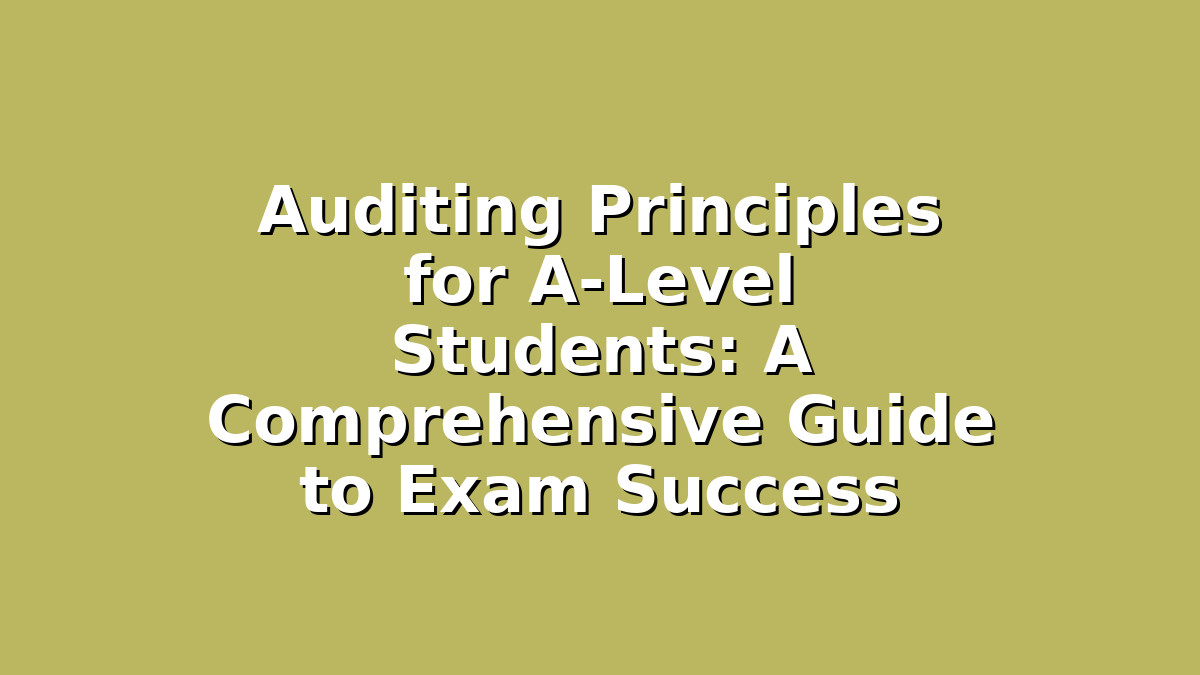Preparing for your A-Level exams can feel overwhelming, especially when tackling complex subjects like Accounting and Business Studies. One key area that often challenges students is understanding auditing principles. Whether you’re studying accounting audits or the broader concept of auditing in business, grasping these principles is crucial not only for exam success but also for building a solid foundation for future studies or careers in finance, business, or law.
In this blog post, we’ll break down auditing principles in a way that’s clear and easy to understand. We’ll also share effective study tips tailored for A-Level students to help you master the topic confidently. Let’s start by explaining what auditing is and why it matters.
What Are Auditing Principles and Why Do They Matter?
At its core, auditing is the process of examining financial statements and records to ensure accuracy, transparency, and compliance with established standards. Auditing principles are the fundamental rules and guidelines auditors follow to conduct fair and thorough reviews. These principles help maintain trust in business operations and financial reporting, which is vital for stakeholders such as investors, customers, and regulators.
For A-Level students, understanding these principles means you can:
– Grasp how businesses maintain financial integrity.
– Analyze case studies with real-world accuracy.
– Answer exam questions confidently, demonstrating both knowledge and application.
Now, let’s dive into three key auditing principles and how you can study and apply them effectively.
—
1. Integrity and Objectivity: Building Trust in Auditing
The first auditing principle is integrity. This means auditors must be honest and straightforward in all professional matters. They should not be influenced by personal interests or external pressures. Closely related is objectivity, which requires auditors to remain impartial and avoid bias during their examinations.
#### How to Study This Principle Effectively
– Create real-life scenarios: Imagine you’re an auditor faced with a dilemma where a company tries to hide information. Write down how integrity and objectivity guide your actions.
– Use flashcards: Summarize the definitions and significance of integrity and objectivity on flashcards. Review these regularly to reinforce your memory.
– Practice past exam questions: Look for past papers that ask about ethical responsibilities of auditors or scenarios requiring objective judgment. Write out your answers to improve clarity and confidence.
Remember, examiners appreciate answers that not only define principles but also demonstrate an understanding of their importance in real auditing situations. Try to explain why integrity and objectivity are essential in ensuring audit quality.
—
2. Confidentiality: Protecting Sensitive Information
Another critical principle is confidentiality. Auditors have access to sensitive financial and operational data. They must protect this information and avoid disclosing it without proper authorization, unless required by law.
#### Study Tips to Master Confidentiality
– Summarize key points: Write a brief note explaining why confidentiality matters and what might happen if it’s breached.
– Connect with your personal experience: Think of a time when you kept a secret or respected someone’s privacy. Relating auditing confidentiality to familiar experiences makes the concept easier to remember.
– Group study discussion: During study groups, discuss the ethical implications of breaking confidentiality in auditing. Debate possible consequences and reinforce your understanding through peer interaction.
Understanding confidentiality also helps you tackle questions about auditor responsibilities and ethical standards. As you study, highlight how confidentiality builds trust between auditors and clients.
—
3. Professional Competence and Due Care: Ensuring Quality in Audits
Professional competence and due care mean auditors must maintain their knowledge and skills to perform audits competently and diligently. This involves keeping up with new laws, accounting standards, and auditing techniques to provide a high-quality audit.
#### Strategies to Learn and Apply This Principle
– Regular revision: Schedule weekly reviews of auditing standards and updates. Use trusted textbooks or online resources recommended by your teachers.
– Practice practical examples: Work through sample audit scenarios where professional competence would affect outcomes, such as identifying errors or fraud.
– Set study goals: Aim to master one auditing technique or standard each week. Setting achievable goals keeps your study organized and less stressful.
In exams, you can impress examiners by linking professional competence to the need for accurate and reliable audits. Highlight how auditors must avoid careless mistakes and continually improve their skills.
—
Bonus Study Tips for Auditing Principles Success
– Use mind maps: Visual learners benefit from drawing mind maps connecting different auditing principles, their definitions, and practical examples.
– Teach someone else: Explaining auditing principles to a friend or family member helps reinforce your understanding and identify any gaps.
– Stay positive and consistent: Remember that mastering auditing principles takes time. Consistent study and practice build confidence gradually. Celebrate small wins to keep motivated.
—
Conclusion: Your Path to Auditing Excellence at A-Level
Auditing principles are more than just textbook definitions—they’re the foundation of ethical and accurate financial reviewing. By understanding integrity, confidentiality, professional competence, and other key principles, you develop the skills to analyze audit scenarios critically and excel in your A-Level exams.
Approaching your studies with practical examples, active revision techniques, and ethical reflections will not only prepare you for exams but also set you up for future success in accounting, business, or finance roles.
Stay curious, keep practicing, and remember that every bit of knowledge you gain is a step towards your academic and career goals. You’ve got this!
—

Responses